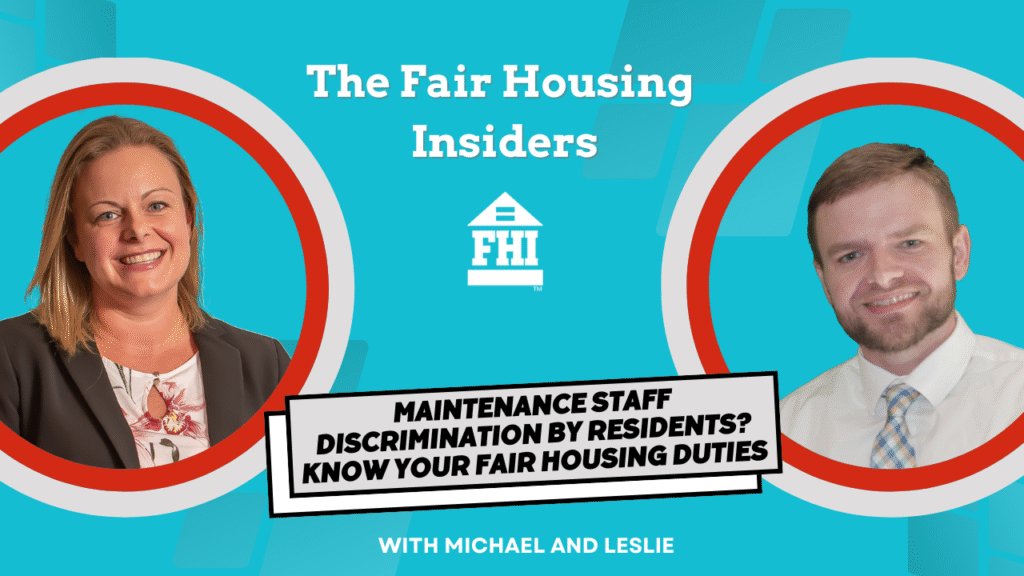Fair housing discussions typically center around protecting residents from discrimination. But what happens when the roles are reversed—when a resident discriminates against an employee? This often-overlooked issue can have serious implications for property managers and owners, especially when frontline staff like maintenance technicians are involved.

Table of Contents
Understanding Employee Rights in Housing Environments
While the Fair Housing Act protects residents, employee protections fall under a different part of federal law. Maintenance staff and other employees are covered under Title VII of the Civil Rights Act, which prohibits discrimination in the workplace based on race, color, religion, sex, or national origin. Even though the Fair Housing Act (Title VIII) governs resident interactions, property management professionals must also recognize their responsibilities under employment law.
In some cases, where employees live onsite, they may have rights under both employment and housing laws. This dual role creates a unique dynamic that demands clear policies and consistent enforcement.
When Residents Refuse Service
It’s not uncommon for a resident to ask that a particular maintenance employee not enter their unit. In large communities with multiple maintenance technicians, it might be logistically easier to honor that request—if it stems from a personality conflict or perceived service issue.
But when the refusal appears rooted in discrimination—such as the employee’s race or gender—the situation requires a completely different response. Managers must evaluate whether the resident’s conduct crosses the line into harassment or discriminatory treatment. If it does, this behavior violates the lease and must be addressed swiftly and clearly.
Responding to Discriminatory Requests
When residents refuse access or make discriminatory remarks:
- Property managers should respond in writing, making it clear that discriminatory behavior will not be tolerated.
- If the refusal affects required maintenance or inspections, it becomes a lease violation, regardless of the resident’s stated reason.
- Under no circumstances should residents be allowed to dictate who is assigned to do their maintenance work based on a protected category.
However, protecting employees from further harm may warrant temporarily adjusting schedules or staffing assignments. The key is that the decision comes from management—not resident pressure.
Policy Recommendations That Make a Difference
To safeguard both your team and your operations, consider reinforcing two essential policies:
- Zero Tolerance for Harassment and Discrimination
- This should be clearly stated in both employee handbooks and resident documents like leases or house rules. It’s not enough to protect residents from discrimination; staff must also be protected—and they should be encouraged to report inappropriate behavior when it happens.
- Witness Policy for Contested Access
- If staffing constraints require a specific employee to continue entering a unit despite a resident’s objection, always send them with a second staff member present. This protects the employee and your company from false claims and ensures there is a witness to any interaction.
The Role of Communication and Training
Communication is the backbone of preventing and addressing discriminatory behavior. Managers should regularly talk with maintenance staff and frontline employees to understand what they’re experiencing in the field. Sometimes, workers may brush off harassment as “just part of the job,” not realizing that what they’re facing is discrimination.
Training is also critical. Employees should know their rights, understand what constitutes harassment, and feel empowered to speak up. Property managers should also train supervisors to recognize warning signs and respond quickly and appropriately.
Creating a Safe and Respectful Workplace
At the end of the day, the responsibility to protect your team rests with leadership. By reinforcing strong policies, encouraging open communication, and educating both residents and staff, housing providers can create a safe, respectful environment where everyone—residents and employees alike—feels valued and protected.
You may also like:
- Preventing Staff Harassment in Property Management
- Fair Housing Liability: When Does Resident-on-Resident Harassment Trigger Management’s Duty to Act?
- Retaliation vs. Rule Enforcement: Navigating the Fair Housing Fine Line
- Top 3 Fair Housing Risks for Property Managers in 2026
- A Year of Upheaval: How 2025 Impacted Fair Housing Operations
